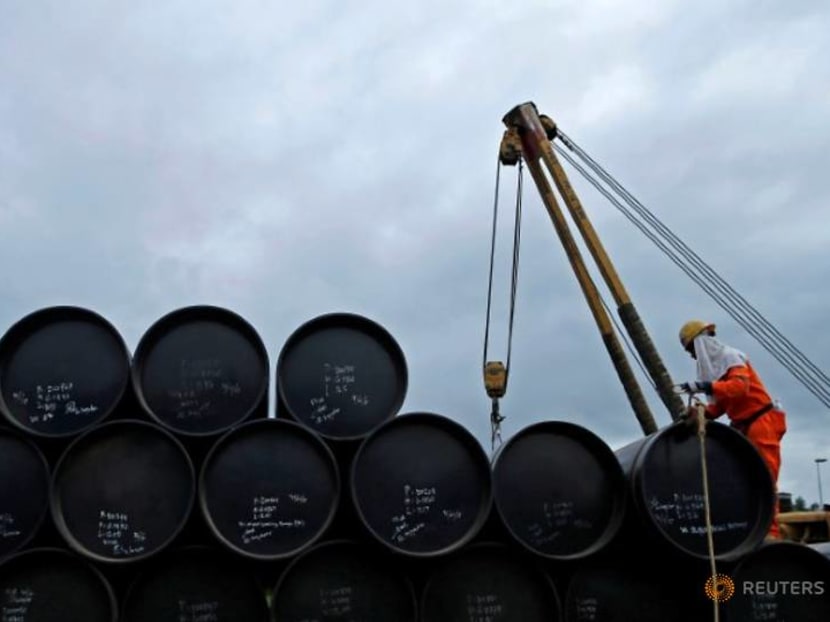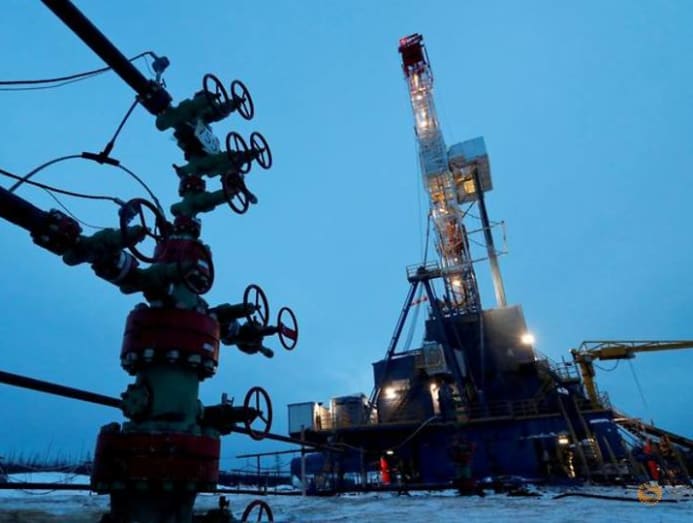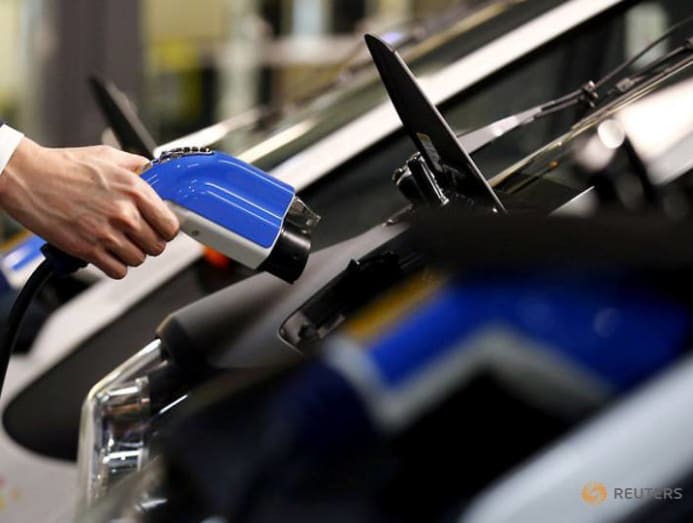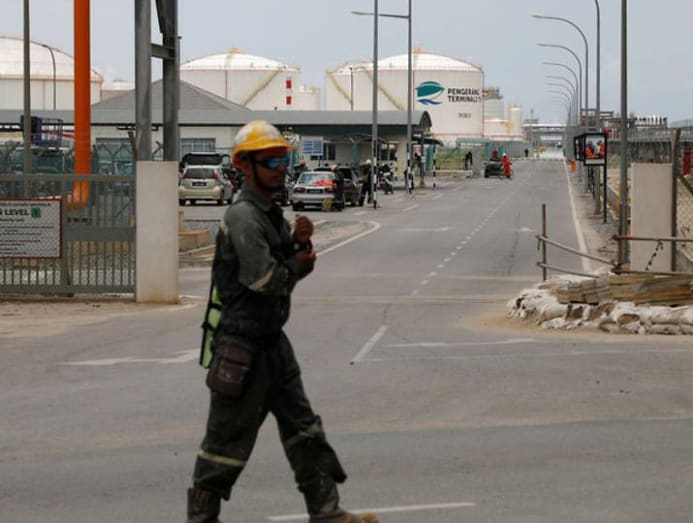Commentary: Ambitious oil facility in Pengerang, Johor a gamble given global climate change agenda
Advertisement
Commentary
Commentary: Ambitious oil facility in Pengerang, Johor a gamble given global climate change agenda
On the one hand, Malaysia is embracing shifts bringing forth more than renewables and electric vehicles. Simply on the other, information technology's opening large oil facilities, says Renato Lima-de-Oliveira.

A worker prepares to transport oil pipelines to be laid for the Pengerang Gas Pipeline Projection in Pengerang, Johor, Feb 4, 2015. REUTERS/Edgar Su/File Photo
nineteen Jul 2022 04:44PM (Updated: 02 Aug 2022 06:20AM)
KUALA LUMPUR: 1 of the nigh aggressive projects of Petronas, Malaysia's national oil company, will soon be fully operational.
The Pengerang Integrated Circuitous (Film), in the southern state of Johor, is poised to transform the land'southward footprint in oil refining and petrochemical production.
Spread across 2,550 ha and the result of a US$27 billion investment in partnership with Saudi Aramco, Pic will business firm a new site of downstream oil operations.
However, at a time when the earth is increasingly stressing the importance of green development and phasing out fossil fuels, are Malaysia and Petronas making the correct bet?
READ: Malaysia'southward Petronas steps upward investments in hydrogen as function of carbon-gratis energy goals
SIGNS OIL IS PAST PEAK DEMAND
In that location are signs oil is at present in a decline. The sudden need devastation caused past the pandemic, when oil consumption vicious by a record of viii.6 one thousand thousand barrels per day (bpd) according to the International Energy Agency, accelerated the plans by central oil and gas (O&G) companies to wean off fossil fuels.
COVID-xix was particularly harmful because oil is primarily used in the transportation sector, which accounts for 57 per cent of total oil demand. Lockdowns are designed to strength people to stay put, and this means not driving or flight.
READ: Commentary: Targeted travel restrictions needed but careful not to undermine Changi Drome's connectivity
Unsurprisingly, the financial results of O&G companies showed record losses for 2020, including Exxon (United states of america$22.4 billion), Shell (United states$21.vii billion), Petronas (US$v billion) and near others.
Oil demand is expected to return to pre-pandemic levels by 2022, at around 100 million bpd, as vaccination rates tick upwards and move restrictions are lifted.
However, oil as a source of energy has been under intense threat from multiple directions. Many agencies and companies now believe oil has reached peak demand or will do so in the next few years. Since the 2022 price crash, the exploration and production segment of the oil industry has non fully recovered.

A 2022 report from the Malaysia Petroleum Resources Corporation shows acquirement from Malaysia's O&G services and equipment manufacture has been declining, registering RM65.i billion (United states of america$xv.5 billion) in 2019, down from over RM80 billion in 2013.
Profit before revenue enhancement has been failing and was barely positive in 2019, at RM1.1 billion. Malaysia's O&K production has been stable since 2008, with about ane.vii million barrels of oil equivalent, but capital letter investments have been going down: From the peak of US$ten billion in 2022 to just U.s.$4.5 billion concluding year, according to Rystad Energy.
With these margin compressions, information technology was already challenging times for the O&G manufacture even before COVID-19.
The International Energy Agency has set out a pathway for countries to transform their energy sector – but how feasible is it? Find out on The Climate Conversations.
TECH AND POLITICS: HEART OF NEW THREATS TO OIL
Technological advances and politics are at the heart of the new threats to the oil industry.
Renewables are already the cheapest compared to fossil fuels in many places, after taking into account both upper-case letter cost and maintenance and fuel costs.
Modern renewables (solar photovoltaics and wind energy) have benefited from tremendous cost reduction. They have enjoyed incremental technological gains, scale economies and learning-by-doing.
Dorsum in 2013, the construction cost of 1 kilowatt of solar PV chapters was above The states$4,000, but by 2022 it was already beneath US$1,848, according to the U.s. Energy Information Agency.
READ: Johor to build largest solar power establish in Southeast Asia: Sultan Ibrahim
In comparison, natural gas construction cost stayed generally apartment (The states$837). Only gas-fired power plants take a college marginal price than renewables due to fuel and higher maintenance costs.
With lower majuscule costs and more than players competing in solar, governments tin procure green free energy at a failing cost. Malaysia has used auctions to purchase solar energy since 2016, with prices falling to less than RM0.xx.
The cheaper electricity generated past renewables is particularly bonny for electric vehicles (EVs), which have benefited from tremendous technological gains in batteries.

EVs are superior to traditional cars: They are more than efficient in converting electrical energy into mechanical power, have lower maintenance costs, and can reduce urban pollution.
EVs are not nonetheless popular in Southeast Asia, but in its Low Carbon Mobility Design 2021-2030, Malaysia'south Ministry of Environment and Water proposed plans to support the manufacture's growth through charging infrastructure and local manufacturing.
READ: Commentary: My journey to owning an electric vehicle has been a worthy ride
Another threat to the oil industry comes from concerted political action. As societies become increasingly conscious of the negative effects greenhouse gas emissions have on the planet, there is greater public pressure in favour of more than sustainable development.
And then it's little wonder governments might promote renewables through feed-in-tariff or solar auctions and discourage fossil fuels past imposing tighter regulations and taxes on carbon emissions.
Similar many countries, Malaysia has adopted policies to promote renewables – and there is a growing business concern ecosystem of green energy developers in the country - simply has still to adopt a carbon tax or a hard policy to phase out coal from its energy matrix.
Regardless of regime policy, the private sector has also joined these efforts through sustainable investing, or initiatives like The Climate Pledge, in which companies commit to achieving cyberspace zero emissions by 2040.
Can emerging markets in Asia pin away from fossil fuels despite growing need? Find out on The Climate Conversations.
PETROCHEMICAL SECTOR SET TO Abound
It is clear to the industry, including oil majors similar Shell, BP, Total and Petronas (which also appear a net zero by 2050 aspiration), that economics and global politics have turned in favour of renewables.
Therefore, the big pic is of an industry that is in its sunset years, because of the growing competitiveness of alternative sources and political drivers confronting information technology. However, this big picture hides heterogeneity.
If oil demand from transportation seems doomed cheers to EVs, it is a different motion-picture show for the petrochemical sector. The use of oil as a feedstock for petrochemicals, bitumen and fertilisers is likely to increase in the years to come.

In fact, based on BP's 2022 forecast, oil demand for petrochemicals is expected to increase until 2040 before declining past current levels – even under an aggressive scenario of net zero by 2050.
Today, ix.7 1000000 bpd are used for petrochemicals. This can abound to as much as 17.5 million bpd by 2050 if one extrapolates from by trends – or slightly reduce to vii.ii meg bpd under a net-zero scenario.
At the middle of Petronas' PIC project is the US$xvi billion RAPID (or Refinery and Petrochemical Integrated Development) refinery. It will add 300,000 barrels per day of refining capacity to Malaysia, most half of the existing capacity of half dozen plants.
RAPID is strategically sited in a major trade route and can turn Malaysia into a net exporter of refined fuels, coming together stringent low-sulphur standards.
READ: Commentary: Oil and gas is not the sunset industry yous retrieve information technology is
Given its design to maximise naphtha (used as a feedstock for petrochemical production), it will exist less exposed to the demand destruction EVs will bring to refineries focused on transportation fuels.
Scale and integration are critical competitive factors in the refining sector. PIC meets these criteria with its production volume and design. Notwithstanding, refining is an activity that traditionally requires loftier investment and has low margins, so operational excellence is critical.
In this regard, the RAPID project has been plagued by delays and major incidents, including two fires, one in March 2020. The long-term success of the project volition depend on running it well and attracting more investors to further develop Pengerang as a petrochemical hub.
READ: Commentary: That low-carbon hereafter for Singapore isn't so far-fetched
The energy transition is a reality that will affect all oil-based evolution projects, including Pengerang. For example, the project incorporates solar panels to generate energy for self-consumption.
However, the transition volition vary past sector. Inside the portfolio of assets that oil companies hold, petrochemical production volition probable be among the last to exist stranded.
This is good news for Pengarang, just Malaysia still needs to be fix for a world where the oil industry will take a back seat.
Renato Lima-de-Oliveira, a PhD from Massachusetts Found of Technology (MIT), is an Assistant Professor of Business and Society at Asia Schoolhouse of Business in Kuala Lumpur, Malaysia.
Contempo Searches
Trending Topics
Source: https://cnalifestyle.channelnewsasia.com/commentary/commentary-ambitious-oil-facility-pengerang-johor-gamble-given-global-climate-change-agenda-294561

0 Response to "Commentary: Ambitious oil facility in Pengerang, Johor a gamble given global climate change agenda"
Postar um comentário